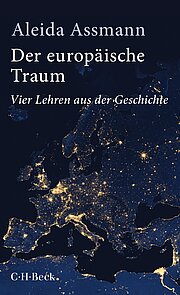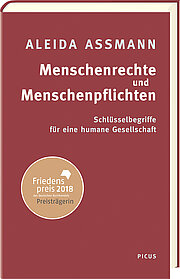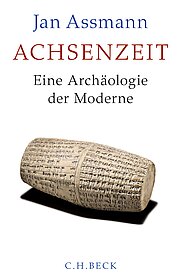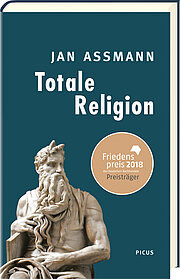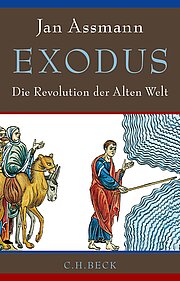The Board of Trustees of the Peace Prize of the German Book Trade has chosen the Aleida and Jan Assmann to be the recipients of this year’s Peace Prize. The award ceremony took place on Sunday, October 14, 2018, at the Church of St. Paul in Frankfurt am Main. The laudation was held by the German-American literary scholar Hans Ulrich Gumbrecht.
Statement of the Jury
The German Publishers and Booksellers Association awards the 2018 Peace Prize of the German Book Trade to Aleida und Jan Assmann In doing so, the association and its members have chosen to honour two exceptional scholars who have inspired and complemented each other’s work for decades.
As a scholar of literary and cultural studies, Aleida Assmann has displayed an unfaltering commitment to investigating the virulent and perennial themes of historical amnesia and memory culture. In view of the growing political instrumentalisation of these themes in recent German history, her scientifically grounded studies continue to provide much needed enlightenment on a broad range of issues relating to the cultural memory of nations. Time and again, her work has illustrated that an open and honest handling of the past is an essential precondition for peaceful coexistence.
As an Egyptologist and a scholar of cultural studies, Jan Assmann has launched international debates on fundamental questions relating to the cultural and religious conflicts of our time. His extensive scientific work has examined the relationship between religion and violence, the genesis of intolerance and the claim to absolute truth, all of which have made an indispensible contribution to our understanding of the willingness and capacity for peace held by religions in today’s global society.
The exhilarating and mutually enhancing unity created by the two voices of Aleida and Jan Assmann has generated a body of work that is of tremendous importance for contemporary debates and, above all, for sustainable peace and understanding among the peoples of the world.
Award ceremony
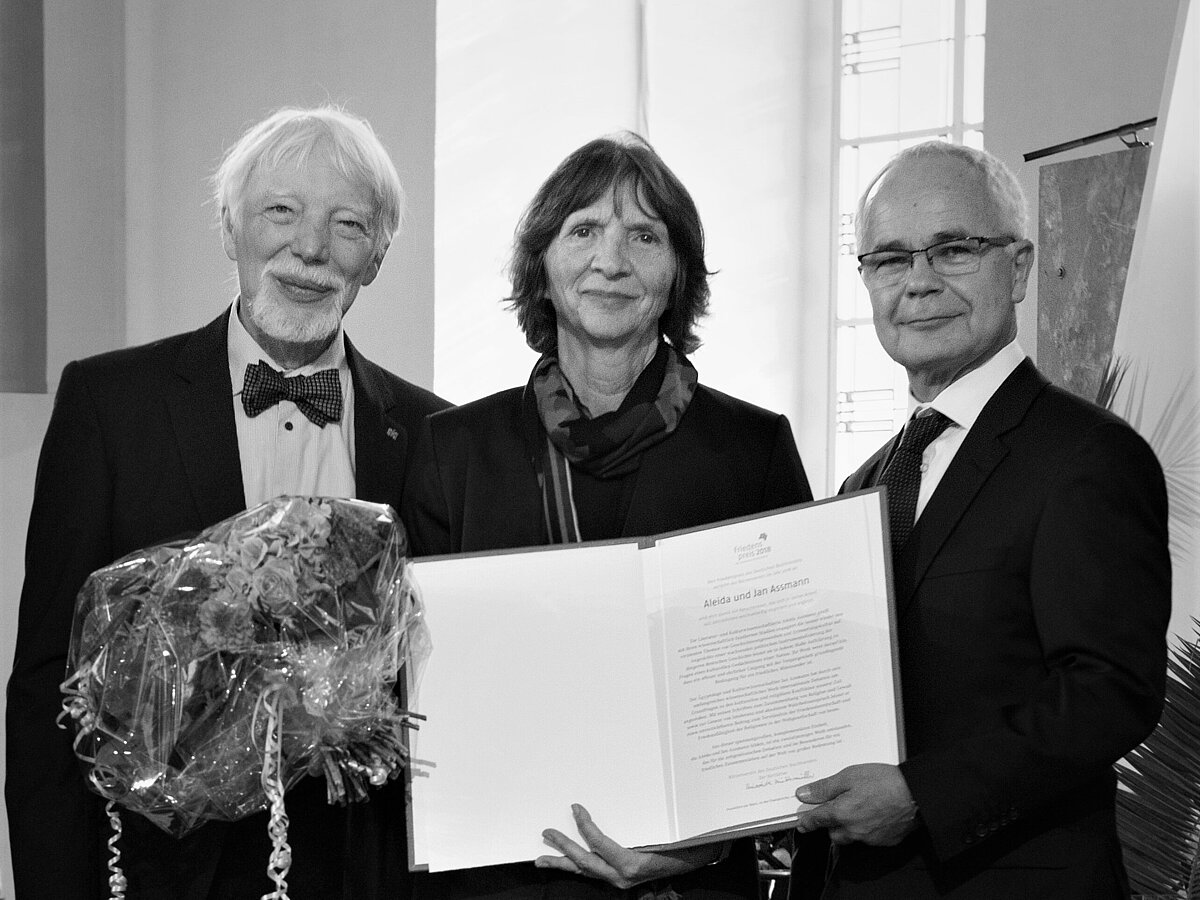
Speeches
A truly effective culture of remembrance always includes a reflection on our potential common future, thus helping to warn the living against engaging in a repetition of history.
Heinrich Riethmüller - Greeting
Heinrich Riethmüller
Greeting of the President
Anyone born in 1938 (such as Jan Assmann) could in no way have participated in the crimes committed in the name of the German nation; and anyone born in 1947 (such as Aleida Assmann) was still within reach of a call from the past obliging them to take on responsibility for crimes that were not part of their own lives or their own remembrance (Andenken).
Hans Ulrich Gumbrecht - Laudation for Aleida and Jan Assmann
Hans Ulrich Gumbrecht
Laudatory speech
A voice that seeks to undermine the pillars upon which the diversity of opinion is built forfeits in that moment any respect it may have had. In other words, democracy thrives not on disputes, but rather on good arguments.
Aleida and Jan Assmann - Acceptance speech
Aleida and Jan Assmann
Acceptance speech
Aleida Assmann
Biography
Aleida Assmann is a German scholar and professor of English and Cultural Studies. She was born on 22 March 1947 in Bethelnear Bielefeld to the New Testament scholar Günther Bornkamm and his wife Elisabeth. Before completing her studies in English and Egyptology in Heidelberg and Tübingen, she met her future husband, Jan Assmann, whom she accompanied on several excavations in Upper Egypt between 1968 and 1975. She earned her doctorate in English in 1977 in Heidelberg with a work on »Die Legitimation der Fiktion« (tr. The Legitimation of Fiction).
In 1978, she joined with her husband to found the research group known as »Archäologie der literarischen Kommunikation« (Archaeology of Literary Communication), which brought representatives of different academic fields and ‘cultural disciplines’ (Sumerology, Indology, African Studies, Sinology, etc.) together in a dialogue. At the first of these conferences (1979), the focus was on ‘Schrift und Gedächtnis’ (‘The Written Word and Memory’) and theories of how these media organise cultures. Aleida and Jan Assmann then used these initial approaches to formulate the concept of ‘cultural memory’, which they defined as an officially constructed and institutionalised form of collective memory in contrast to purely subjective individual memories. As a complement to the study of the history of facts – a form of investigation based on objectivity and committed to the scrutiny of sources –, they examined the influence of practices of collective memory on politics and the identity of societies. Today, they continue to take up subjects drawn from our present day – such as the question of the individual and collective memory of the Shoah – and seek to investigate literary history within these broad cultural scientific frameworks.
One year after receiving her Habilitation title in 1992 at the Neuphilosophische Fakultät in Heidelberg, Aleida Assmann became Chair of English and Comparative Literature at the University of Konstanz. She also held numerous visiting professorships and fellowships, which have taken her to Rice University Texas, Princeton and Yale as well as to the University of Vienna. Since the 1990s, in addition to several works on English literature and the archaeology of literary communication, she has dealt primarily with the subject of cultural memory, memory and forgetting.
For example, in her 2006 Buch »Der lange Schatten der Vergangenheit. Erinnerungskultur and Geschichtspolitik« (»Shadow of Trauma. Memory and Politics of Postwar Identity«, 2016), she highlights different paths that lead from individual constructions of the past to collective ones. She examines the tensions between personal experience and official commemoration, while also providing suggestions for an apposite culture of remembrance and arguing in favour of giving memory a »common memory space«, which could become tangible in a day of remembrance. Assmann distinguishes between individual memory, which the individual shares with family and friends, and national memory, which the residents of a country participate in by means of the public media as well as via monuments, museums and memorial days. In this memory, those parts of the past that are important for the self-understanding of the nation are kept alive in consciousness and can provide orientation for the present and the future.
In her latest book, »Menschenrechte und Menschenpflichten« (2017; tr. Human Rights and Human Duties), she identifies three aspects that are essential to facilitating a new and urgently needed social contract, especially in light of the current debate over refugees: the political assertion of human rights as a vital modern historical achievement, society-wide support for these rights drawing on ancient values such as empathy and solidarity, and a canon of rules for the fair and respectful coexistence of existing residents and immigrants, for which she coined the term »Menschenpflichten« or human duties.
Aleida Assmann lives with her husband Jan Assmann in Constance. The couple has five children (Vincent, David, Marlene, Valerie and Corinna).
Awards
2018 Peace Prize of the German Book Trade (with Jan Assmann)
2017 Balzan-Prize (with Jan Assmann)
2017 Karl-Jaspers-Prize (with Jan Assmann)
2016 Theologischer Preis der Salzburger Hochschulwochen (with Jan Assmann)
2014 A.H.-Heineken-Preis für Geschichte
2011 Ernst-Robert-Curtius-Preis für Essayistik
2009 Max-Planck-Forschungspreis: Geschichte und Gedächtnis
2009 Paul Watzlawick Ehrenring, Wien
2008 Ehrendoktor der theologischen Fakultät Oslo
1999 Forschungspreis für Geisteswissenschaften der Philip Morris Stiftung
Bibliography
Der europäische Traum. Vier Lehren aus der Geschichte
Verlag C.H. Beck (München 2018, 223 Seiten, ISBN 978-3-406-73380-2, 16,95 €
Menschenrechte und Menschenpflichten
Picus Verlag (Wien 2017), 192 Seiten, (auch als E-Book), ISBN: 978-3-7117-2072-6, 22,00 €
Formen des Vergessens
Wallstein Verlag, Göttingen 2016 (auch als E-Book)
Vom modernen zum modernen Zeitregime. Shakespeare und Milton
UVK, Konstanz 2016
Das Gedächtnis der Stadt
mit Fotos von Wolodymyr Huzul und einem Nachwort von Oxana Matiychuk AphorismA, Berlin 2016
HERAUSGEBERSCHAFT
:
The Blessed Plot. Studien zur englischen Literatur- und Kulturgeschichte
herausgegeben von Ines Detmers, Michel C. Frank und Ana Sobral Universitätsverlag Winter, Heidelberg 2016
Empathy and its Limits
edited by Aleida Assmann and Ines Detmers Palgrave Macmillan, London 2016
Rendezvous mit dem Realen. Die Spur des Traumas in den Künsten
herausgegeben von Aleida Assmann, Karolina Jeftic und Friederike Wappler transcript, Bielefeld 2014 (auch als E-Book)
Schweigen
herausgegeben von Jan Assmann und Aleida Assmann Verlag Wilhelm Fink, Paderborn 2013
Vollkommenheit
herausgegeben von Jan Assmann und Aleida Assmann Verlag Wilhelm Fink, München 2010
Verwandlungen
herausgegeben von Jan Assmann und Aleida Assmann Verlag Wilhelm Fink, München 2006
Positionen der Kulturanthropologie
herausgegeben von Aleida Assmann, Ulrich Gaier und Gisela Trommsdorff Suhrkamp Verlag, Frankfurt am Main 2004
Hieroglyphen. Stationen einer anderen abendländischer Grammatologie
herausgegeben von Jan Assmann und Aleida Assmann Verlag Wilhelm Fink, München 2003
Ruinenbilder
herausgegeben von Aleida Assmann, Monika Gomille und Gabriele Rippl Verlag Wilhelm Fink, Paderborn 2002
Aufmerksamkeiten
herausgegeben von Jan Assmann und Aleida Assmann Verlag Wilhelm Fink, München 2001
Einsamkeit
herausgegeben von Jan Assmann und Aleida Assmann Verlag Wilhelm Fink, München 1999
Schleier und Schwelle. Band 3: Geheimnis und Neugierde
herausgegeben von Jan Assmann und Aleida Assmann Verlag Wilhelm Fink, München 1999
Schleier und Schwelle. Band 2: Geheimnis und Offenbarung
herausgegeben von Jan Assmann und Aleida Assmann Verlag Wilhelm Fink, München 1998
Schleier und Schwelle. Bd 1: Geheimnis und Öffentlichkeit
herausgegeben von Jan Assmann und Aleida Assmann Verlag Wilhelm Fink, München 1997
Weisheit
herausgegeben von Aleida Assmann Verlag Wilhelm Fink, Paderborn 1991
Kanon und Zensur
herausgegeben von Jan Assmann und Aleida Assmann Verlag Wilhelm Fink, München 1987
Schrift und Gedächtnis
herausgegeben von Jan Assmann, Aleida Assmann und Christof Hardmeier Verlag Wilhelm Fink, München 1984 (3. Auflage 1998)
Jan Assmann
Biography
The German Egyptologist, religious scholar and cultural scientist Jan Assmann was born on 7 July 1938 in Langelsheim (Harz) to the architect Hans Assmann and his wife Charlotte. A music enthusiast from a very early age, Assmann decided against a career in music, although he would later publish numerous essays on music theory. He attended university in Heidelberg, first to pursue Classical Archaeology and Greek Studies, before then turning to Egyptology. In 1965, after studying in Munich, Göttingen and Paris, Assmann received his doctorate in Heidelberg on the subject of »Liturgische Lieder an den Sonnengott« (»Liturgical Songs to the Sun God«).
After a one-year journey through Egypt, Syria, Jordan and Asia Minor (Anatolia) on a travel grant from the German Archaeological Institute, Assmann worked from 1967 onwards for the German Archaeological Institute in Cairo. There, he began archaeological field work in the necropolis of Thebes near Luxor, where he focused on inscriptions (epigraphy). In 1978, he became head of the excavations in Luxor and began publishing works on tombs and gravesites of the Ramesside period. After receiving his Habilitation title in 1971 with a work on the grave of a late-period official (»Das Grab des Basa (Nr.389) in der thebanischen Nekropole«) (The Grave of Basa (Nr.389) in Necropolis in Thebes), Assmann became Chair of Egyptology in Heidelberg, a position he held until his retirement as an emeritus professor in 2003. He also held numerous visiting professorships and fellowships, which took him to Berlin, Munich, the US, Paris and Jerusalem. In 2005, he received an Honorary Professorship in Cultural Studies and Religious Theory at the University of Konstanz.
Throughout the course of his scholarly work, Jan Assmann has made fundamental contributions to the development, editing and interpretation of sources relating to Egyptian religion (hymns, liturgies of the dead, rituals). From the very beginning, he pursued interdisciplinary approaches, for example by connecting philological interpretations of texts with archaeological findings, as well as by taking into account cultural and socioeconomic backgrounds. Unlike traditional historiography, he sees literature – and thus fiction – as a relevant source of facts. By analysing cults of the dead, Assmann also spotlights the issue of which particular self-conceptions a culture seeks to impart about itself to future generations. In 1978, he joined with his wife Aleida Assmann to found the research group »Archäologie der literarischen Kommunikation« (Archaeology of Literary Communication, see biography of Aleida Assmann).
In his work on Egypt and cultural science, Assmann revises the biblical image of Ancient Egypt as an enslaved society under the rule of the Pharaohs and instead portrays it as a civilisation guided by concepts of order and justice (Ma'at). Above all else, he argues, these concepts contain norms that are designed to foster coexistence, such as justice, responsibility and an awareness of injustice. In »Der Tod als Thema der Kulturtheorie« (2000, tr. Death as a Theme in Cultural Theory), he argues that death is the centre of meaning in every culture and that humankind creates culture in order to endure the knowledge of death and finitude.
Jan Assmann became known to a wider audience with his works on the emergence of monotheism, which he sees as having its beginnings in the exodus of the Israelites from Egypt, for example in »Moses der Ägypter« (1998; »Moses the Egyptian«, 1998) and »Die Mosaische Unterscheidung oder Der Preis des Monotheismus« (2003; »The Price of Monotheism«, 2009). According to Assmann, every form of monotheism is based on the distinction between true and false religion – something that is completely alien to polytheistic religions. Their gods were able to be translated and carried across cultures, a process that was rendered impossible by the new, revelation-based concept of absolute truth provided by monotheism. Assmann connects this theological shift from polytheism to monotheism with the rejection of the pagan past of the Israelites and interprets the ardent hatred of the Canaanites as a “retrospective self-hatred, a hatred of the past from which one wishes to free oneself”. He thus argues that monotheism contains a structural intolerance that can repeatedly lead to religious, cultural and political disputes.
In »Exodus. Die Revolution der Alten Welt« (2015; tr. Exodus. The Revolution of the Ancient World), Jan Assmann traces the Exodus narrative back to ancient Egypt and forward into the 20th century. Here, he adds to his previous analyses by placing the focus on the concept of the covenant, on the »monotheism of loyalty«. The result is not the dissolution of a propensity to violence motivated by monotheism; in fact, according to a review by Micha Brumlik (Frankfurter Rundschau, 5 June 2015), Assmann simply relocates the rationale to the more complex relationship between loyalty and disloyalty that repeatedly appears in the revolutionary, world-historical consequences of the Exodus from Egypt.
In his 2016 book »Totale Religion. Ursprünge and Formen puritanischer Verschärfung« (tr. Total Religion. Origins and Forms of Puritanical Intensification), Jan Assmann spans an arc to the current discussions regarding the potential for violence held by societies shaped by monotheism. In doing so, he does not focus on the question of whether monotheism prevailed in history by means of force; instead, he seek to examine why it recollects and portrays the history of its enforcement in biblical texts in such brutal forms of violence and under what historical conditions this language of violence leads to real-life actions.
Jan Assmann lives with his wife Aleida Assmann in Constance. The couple has five children (Vincent, David, Marlene, Valerie and Corinna).
Awards
2018 Friedenspreis des Deutschen Buchhandels (with Aleida Assmann)
2017 Balzan-Preis (with Aleida Assmann)
2017 Karl-Jaspers-Preis (with Aleida Assmann)
2016 Sigmund-Freud-Preis für wissenschaftliche Prosa
2016 Theologischer Preis der Salzburger Hochschulwochen (with Aleida Assmann)
2011 Thomas-Mann-Preis
2007 Europäischer Essay-Preis Charles Veillon für Lebenswerk
2006 Alfried-Krupp-Wissenschaftspreis
2006 Bundesverdienstkreuz Erster Klasse
2005 Ehrendoktorwürde der Hebräischen Universität Jerusalem
2004 Ehrendoktorwürde der Yale University, New Haven, USA
1998 Ehrendoktorwürde der Westfälischen Wilhelms-Universität Münster
1998 Preis des Historischen Kollegs
1996 Max-Planck-Forschungspreis
Bibliography
Achsenzeit. Eine Archäologie der Moderne
Verlag C.H. Beck (München) 2018, 352 Seiten, ISBN 9783406729881, 26,95 €
Totale Religion. Ursprünge und Formen puritanischer Verschärfung
Picus Verlag (Wien) 2016, 194 Seiten, ISBN 978-3-7117-2045-0, 20,00 €
Exodus. Die Revolution der alten Welt
Verlag C.H.Beck (München 2015), 493 Seiten, ISBN 978-3-406-67430-3,
Die Zauberflöte. Eine Oper mit zwei Gesichtern
Picus Verlag, Wien 2015 (auch als E-Book)
Das Oratorium 'Israel in Egypt' von Georg Friedrich Händel
Katholisches Bibelwerk, Stuttgart 2015
Exodus. Die Revolution der Alten Welt
Verlag C.H.Beck, München 2015 (auch als E-Book)
Monotheismus unter Gewaltverdacht. Zum Gespräch mit Jan Assmann
von Jan-Heiner Tück Herder Verlag, Freiburg 2015
Reinholds ‚Die Hebräischen Mysterien‘ und Schillers ‚Die Sendung Moses
Garamond, Gera 2014
Steinzeit und Sternzeit: Altägyptische Zeitkonzepte
Verlag Wilhelm Fink, Paderborn 2011 (E-Book 2012)
Wem gehört die Geschichte? Aleida und Jan Assmann über Erinnern und Vergessen
supposé, Wyk 2011 (Hörbuch)
Religio Duplex. Ägyptische Mysterien und europäische Aufklärung
Verlag der Weltreligionen, Berlin 2010 (Neuauflage 2017)
Altägyptische Totenliturgien. Osirisliturgien in Papyri der Spätzeit
von Jan Assmann mit Martin Bommas und Andrea Kucharek Universitätsverlag Winter, Heidelberg 2008
Monotheismus und die Sprache der Gewalt
Picus Verlag, Wien 2007 (E-Book 2012)
Erinnertes Ägypten. Pharaonische Motive in der europäischen Religions- und Geistesgeschichte
Kulturverlag Kadmos, Berlin 2007
Thomas Mann und Ägypten. Mythos und Monotheismus in den Josephsromanen. Wolf-Daniel Hartwich (1968–2006) in memoriam
Verlag C.H.Beck, München 2006
Die Zauberflöte. Oper und Mysterium
Carl Hanser Verlag, München 2006
Altägyptische Totenliturgien. Totenliturgien und Totensprüche in Grabinschriften des Neuen Reiches
von Jan Assmann, überarbeitet von Martin Bommas und Andrea Kucharek Universitätsverlag Winter, Heidelberg 2005
Theologie und Weisheit im alten Ägypten
Verlag Wilhelm Fink, München 2004
Ägyptische Geheimnisse
Verlag Wilhelm Fink, München 2004
Die Mosaische Unterscheidung oder Der Preis des Monotheismus
Carl Hanser Verlag, München 2003 (Neuauflage 2010)
Tod und Jenseits im alten Ägypten
Verlag C.H.Beck, München 2001(Sonderausgabe, Verlag C.H.Beck, München 2010)
Weisheit und Mysterium. Das Bild der Griechen von Ägypten
Verlag C.H.Beck, München 2000
Moses der Ägypter. Entzifferung einer Gedächtnispur
S. Fischer Verlag, Frankfurt am Main 2000
Herrschaft und Heil. Politische Theologie in Ägypten, Israel und Europa
Carl Hanser Verlag, München 2000
Religion und kulturelles Gedächtnis
Verlag C.H.Beck, München 2000 (4. Aufl. 2017)
Das verschleierte Bild zu Sais. Schillers Ballade und ihre griechischen und ägyptischen Hintergründe
Verlag De Gruyter, Berlin 1999 (Reprint 2011)
Moses der Ägypter. Entzifferung einer Gedächtnisspur
Carl Hanser Verlag, München 1998
Ägypten. Eine Sinngeschichte
Carl Hanser Verlag, München 1996 (S. Fischer Verlag, Frankfurt am Main 1999)
Ma'at. Gerechtigkeit und Unsterblichkeit im Alten Ägypten
Verlag C.H.Beck, München 1995 (E-Book 2017)
Monotheismus und Kosmotheismus. Ägyptische Formen eines ‚Denkens des Einen‘ und ihre europäische Rezeptionsgeschichte
Universitätsverlag Winter, Heidelberg 1993
Das kulturelle Gedächtnis. Schrift, Erinnerung und politische Identität in frühen Hochkulturen
Verlag C.H.Beck, München 1992 (Neuauflage 2013; E-Book 2017)
Stein und Zeit. Mensch und Gesellschaft im alten Ägypten
Verlag Wilhelm Fink, München 1991 (3. Auflage 2003)
Sonnenhymnus. Der Sonnengesang des Echnaton
von Jan Assmann und Ralph Mohnnau, illustriert von Wol Müller Alpha Literatur, Frankfurt am Main 1991
Ägypten. Theologie und Frömmigkeit einer frühen Hochkultur
Kohlhammer, Stuttgart 1984
Re und Amun. Die Krise des polytheistischen Weltbilds im Ägypten der 18.-20. Dynastie
Fribourg/ Göttingen 1983
Ägyptische Hymnen und Gebete
Artemis & Winkler, Zürich und München 1975 (Neuauflage 1999)
Zeit und Ewigkeit im Alten Ägypten. Ein Beitrag zur Geschichte der Ewigkeit
Universitätsverlag Winter GmbH, Heidelberg 1975
Das Grab des Basa (Nr.389) in der thebanischen Nekropole
(Grabung im Asasif, Archäologische Veröffentlichungen 6), Mainz 1973
Der König als Sonnenpriester. Ein kosmographischer Begleittext zur kultischen Sonnenhymnik in thebanischen Tempeln und Gräbern
(ADAIK 7), Glückstadt 1970
Liturgische Lieder an den Sonnengott. Untersuchungen zur altägyptischen Hymnik I
(Münchner Ägyptologische Studien 19), Berlin 1969
HERAUSGEBERSCHAFT
.
Ägyptische Götterliteratur
herausgegeben von Jan Assmann und Andrea Kucharek Verlag der Weltreligionen, Berlin 2018 (erscheint 09/2018
Homo religiosus. Vielfalt und Geschichte des religiösen Menschen
herausgegeben von Jan Assmann und Harald Strohm Verlag Wilhelm Fink, Paderborn 2014
Schweigen
herausgegeben von Jan Assmann und Aleida Assmann Verlag Wilhelm Fink, Paderborn 2013
Orakel und Offenbarung. Formen göttlicher Willensbekundung
herausgegeben von Jan Assmann und Harald Strohm Verlag Wilhelm Fink, Paderborn 2012
Die Zauberflöte. Ein literarischer Opernbegleiter. Mit dem Libretto Emanuel Schikaneders und verwandten Märchendichtungen
herausgegeben von Jan Assmann Manesse Verlag, Zürich 2012 (auch als E-Book)
Echnaton und Zarathrustra. Zur Genese und Dynamik des Monotheismus
herausgegeben von Jan Assmann und Harald Strohm Verlag Wilhelm Fink, Paderborn 2012
Herrscherkult und Heilserwartung
herausgegeben von Jan Assmann und Harald Strohm Verlag Wilhelm Fink, München 2010
Magie und Religion
herausgegeben von Jan Assmann und Harald Strohm Verlag Wilhelm Fink, München 2010
Altägyptische Totenliturgien. Die Klagelieder von Isis und Nephthys in Texten der Griechisch-Römischen Zeit
von Andrea Kucharek, herausgegeben von Jan Assmann Universitätsverlag Winter, Heidelberg 2010
Der Mann Moses und die monotheistische Religion
von Sigmund Freud, herausgegeben von Jan Assmann Philipp Reclam, Ditzingen 2010
Vollkommenheit
herausgegeben von Jan Assmann und Aleida Assmann Verlag Wilhelm Fink, München 2010
Ägyptische Religion. Totenliteratur
Aus dem Ägyptischen übersetzt und herausgegeben von Jan Assmann und Andrea Kucharek Insel Verlag, Frankfurt am Main 2008
Sintflut und Gedächtnis. Erinnern und Vergessen des Ursprungs
herausgegeben von Jan Assmann und Martin Mulsow Verlag Wilhelm Fink, München 2006
Die Hebräischen Mysterien oder Die älteste religiöse Freimaurerey
von Carl L. Reinhold, herausgegeben und mit einem Nachwort von Jan Assmann Edition Mnermosyne, Neckargemünd 2006
Verwandlungen
herausgegeben von Jan Assmann und Aleida Assmann Verlag Wilhelm Fink, München 2006
Der Ursprung der Geschichte. Archaische Kulturen, das Alte Ägypten und das frühe Griechenland
herausgegeben von Jan Assmann und Klaus E. Müller Verlag Klett-Cotta, Stuttgart 2005
Der Abschied von den Toten. Trauerrituale im Kulturvergleich
herausgegeben von Jan Assmann, Franz Maciejewski und Axel Michaelis Wallstein Verlag, Göttingen 2005 (E-Book 2013)
Hieroglyphen. Stationen einer anderen abendländischer Grammatologie
herausgegeben von Jan Assmann und Aleida Assmann Verlag Wilhelm Fink, München 2004
Altägyptische Totenliturgien. Totenliturgien in den Sargtexten des Mittleren Reiches
herausgegeben von Jan Assmann und Martin Bommas Universitätsverlag Winter, Heidelberg 2004
Religionsphilosophische Schriften von Plutarch
herausgegeben von Herwig Görgemanns mit Jan Assmann und Reinhard Feldmeier Artemis & Winkler, Düsseldorf/ Zürich 2003
Hieroglyphen. Stationen einer anderen abendländischen Grammatologie
herausgegeben von Jan Assmann und Aleida Assmann Verlag Wilhelm Fink, München 2003
Ägyptische Mysterien?
herausgegeben von Jan Assmann und Martin Bommas Verlag Wilhelm Fink, München 2002
Der Tod als Thema der Kulturtheorie
von Jan Assmann und Thomas Macho Suhrkamp Verlag, Frankfurt am Main 2001
Aufmerksamkeiten
herausgegeben von Jan Assmann und Aleida Assmann Verlag Wilhelm Fink, München 2001
Einsamkeit
herausgegeben von Jan Assmann und Aleida Assmann Verlag Wilhelm Fink, München 1999
Schleier und Schwelle. Band 3: Geheimnis und Neugierde
herausgegeben von Jan Assmann und Aleida Assmann Verlag Wilhelm Fink, München 1999
Gerechtigkeit
herausgegeben von Jan Assmann, Bernd Janowski und Michael Welker Verlag Wilhelm Fink, München 1998
Schleier und Schwelle. Band 2: Geheimnis und Offenbarung
herausgegeben von Jan Assmann und Aleida Assmann Verlag Wilhelm Fink, München 1998
Schleier und Schwelle. Bd 1: Geheimnis und Öffentlichkeit
herausgegeben von Jan Assmann und Aleida Assmann Verlag Wilhelm Fink, München 1997
Text und Kommentar
herausgegeben von Jan Assmann und Burkhard Gladigow Verlag Wilhelm Fink, München 1995
Kultur und Konflikt
herausgegeben von Jan Assmann und Dietrich Harth Suhrkamp Verlag, Frankfurt am Main 1990
Fragen an die altägyptische Literatur. Studien zum Gedenken an Eberhard Otto
herausgegeben von Jan Assmann, Erika Feucht und Reinhard Grieshammer L. Reichert, Wiesbaden 1990
Kanon und Zensur
herausgegeben von Jan Assmann und Aleida Assmann Verlag Wilhelm Fink, München 1987
Schrift und Gedächtnis
herausgegeben von Jan Assmann, Aleida Assmann und Christof Hardmeier Verlag Wilhelm Fink, München 1984 (3. Auflage 1998)
Hans Ulrich Gumbrecht
Hans Ulrich Gumbrecht, born in Würzburg in 1948, studied, after a final year of secondary school at the Lycée Henri IV in Paris, Romance, German, philosophy and sociology in Germany, Spain and Italy. He subsequently taught at the universities of Constance, Bochum and Siegen. In 1989 he accepted a call to Stanford University in California, where he taught as Albert Guérard Professor in Literature from 1993 to 2018. His work focuses on Western philosophy since the 18th century, the Romanesque literatures of the Middle Ages and the early 20th century in particular, and the aesthetics of sport.
He became known to a wider German-speaking public through articles in the "Frankfurter Allgemeine Zeitung", the "Neue Zürcher Zeitung", the weekly newspaper "DIE ZEIT" and the monthly magazine "Merkur", but also through his book publications. His cultural-historical study "1926: One Year on the Edge of Time" (Suhrkamp Verlag 2001), in which he traced a dense panorama of cultural life in the interwar period, has attracted just as much attention as his book "After 1945" (Suhrkamp Verlag 2012), in which he deals with the latent, invisible present of the past.
Gumbrecht has received ten honorary doctorates, including from Ilia State University in Tbilisi, as well as the Deans' Award for Distinguished Teaching at Stanford (1996), the Cuthbertson Award for Exceptional Contributions to Stanford University (2000) and the José Vasconcelos World Award of Education (2012).
